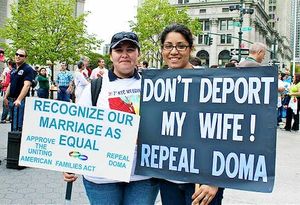This is the fourth in a series of analyses about the Supreme Court's decision to hear cases challenging the constitutionality of the Defense of Marriage Act and Proposition 8.
Today's discussion: What the DOMA case does not address.
In about six weeks, the Supreme Court will hear arguments on the constitutionality of Section 3 of the Defense of Marriage Act (DOMA) and Proposition 8. Fifteen weeks later, the Court will hand down a decision in which a majority is likely to declare that part of DOMA unconstitutional. Although that will be a great day for gay rights, in general, and married gay couples, in particular, it is by no means the end of the story.
The end of DOMA Section 3 means that the federal government will return to doing what it has always done: recognizing those couples the States say are married. Section 3's discriminatory definition of marriage denies legally married same-sex couples the thousands of federal rights normally associated with getting married, including everything from health insurance to survivorship benefits to immigration rights for bi-national couples.
It is the last issue that is particularly vexing not only because gay binational couples have had to survive under a tragic regime that rips apart two people in love, but also because the end of DOMA is a half measure that leaves thousands of these men and women without equal rights.
In a post-DOMA world, the U.S. citizen of a legally married gay binational couple who was married and lives in a marriage equality state would be able to sponsor his foreign national spouse for a visa. But, what if you were married in New Hampshire (an equality state) and live in Kansas (a non-equality state that doesn't recognize out-of-state same-sex marriages)?
Well, that's an open question that we can discuss AFTER THE JUMP…
 Consider this hypothetical: Eddie and Marius are gay and were married last year in a civil ceremony in the State of New York. Eddie was born in Redmayne, New Jersey; Marius is a citizen of France. The two men live in Lincoln, Nebraska, where Eddie is a chef and Marius is a French teacher. Marius's temporary work visa has expired and the government is getting ready to send him back to France. Naturally, the couple wants to stay together, but Eddie cannot leave Nebraska, let alone the United States, at this time. Can Eddie, a U.S. citizen, sponsor his husband Marius for a spousal visa?
Consider this hypothetical: Eddie and Marius are gay and were married last year in a civil ceremony in the State of New York. Eddie was born in Redmayne, New Jersey; Marius is a citizen of France. The two men live in Lincoln, Nebraska, where Eddie is a chef and Marius is a French teacher. Marius's temporary work visa has expired and the government is getting ready to send him back to France. Naturally, the couple wants to stay together, but Eddie cannot leave Nebraska, let alone the United States, at this time. Can Eddie, a U.S. citizen, sponsor his husband Marius for a spousal visa?
Today, the answer is easy: No, he can't. DOMA prevents the federal government, which handles all immigration issues, from recognizing the marriage as valid simply because it is a marriage between two men.
But, if DOMA were gone, if the Supreme Court declares it unconstitutional or Congress passes the Respect for Marriage Act, the answer is unclear. The central question is this: What matters for federal recognition of a marriage: The state of celebration, i.e., where the couple got married and got a marriage certificate from the state, or the state of domicile, i.e., where the couple lives, works, and pays taxes?
Non-lawyers might find this distinction aggravating. That someone lives in Fort Lee, New Jersey (the first town just west of the Hudson River), but got married 10 minutes away in Manhattan, seems a poor, unjust, and heartlessly semantic reason to rend apart a loving and committed couple.
Nevertheless, the distinction's injustice does not make it inapplicable.
Some evidence suggests that it is the state of domicile that matters. A similar case might involve first cousin marriage, which is banned in 30 states (as of last year). Arizona is among those 30 states and it has refused to recognize out-of-state first cousin marriages even if the marriages were legal where performed or celebrated. As a result, Arizona state courts have denied widows of such marriages any rights vis-a-vis the state after spousal death (e.g., In re Mortenson's Estate). And, in many cases, federal tax benefits have denied to these types of widows upon the death of the first-cousin spouse.
 Then there are cases like In re Jose Mauricio Lovo-Lara at the Board of Immigration Appeals (BIA). The BIA is an intermediate administrative review board within the Department of Justice that reviews the decisions of immigration judges, kind of like the Second Circuit reviews decisions from the Southern District of New York. Lovo-Lara concerned the spousal visa application for an El Salvadorian man married to a post-operative male-to-female transgender individual, a U.S. citizen and resident of North Carolina. North Carolina recognized both the sex change and the marriage as valid. The BIA said that DOMA did not apply because the marriage was not between two individuals of the same-sex and that the federal government should accept as valid based on the state of celebration. The panel also reminded us that other states need not recognize the marriage if marriages involved transgender individuals conflict with the deeply rooted public policy of that state.
Then there are cases like In re Jose Mauricio Lovo-Lara at the Board of Immigration Appeals (BIA). The BIA is an intermediate administrative review board within the Department of Justice that reviews the decisions of immigration judges, kind of like the Second Circuit reviews decisions from the Southern District of New York. Lovo-Lara concerned the spousal visa application for an El Salvadorian man married to a post-operative male-to-female transgender individual, a U.S. citizen and resident of North Carolina. North Carolina recognized both the sex change and the marriage as valid. The BIA said that DOMA did not apply because the marriage was not between two individuals of the same-sex and that the federal government should accept as valid based on the state of celebration. The panel also reminded us that other states need not recognize the marriage if marriages involved transgender individuals conflict with the deeply rooted public policy of that state.
There is something to be said for taking one step at a time. The question of the constitutionality of DOMA's discriminatory definition of marriage is also a distinct legal question from the source of the definition of marriage in a post-DOMA world. In the legal world, that means we need another case: judges generally address only the discrete legal question before them, so this question is beyond the reach of Windsor v. United States. In the political world, we can lobby the Obama Administration to direct immigration judges and the BIA to accept the validity of marriages for federal law based on the state of celebration. Although this strategy could be reversed by a future, antigay administration, an executive order could still save countless committed gay couples from being ripped apart.
That said, let's get rid of DOMA first.
***
Ari Ezra Waldman teaches at Brooklyn Law School and is concurrently getting his PhD at Columbia University in New York City. He is a 2002 graduate of Harvard College and a 2005 graduate of Harvard Law School. His research focuses on technology, privacy, speech, and gay rights. Ari will be writing weekly posts on law and various LGBT issues.
(top photo and screencap – Lavi Soloway – The Doma Project)




